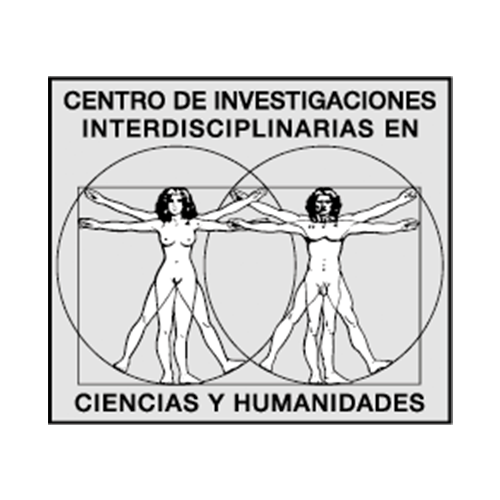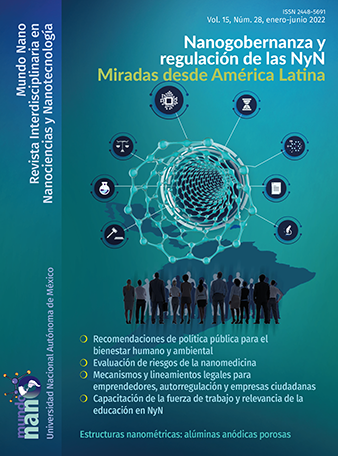Nano-governance, nano-regulation and nano-citizenship? An analysis of normative scenarios in Brazil and Argentina
Main Article Content
Abstract
The work presents advances in our research on nanotechnology development in Argentina and Brazil, with an analysis focused on its governance at international and national scales. By governance we will understand a systemic function, of modulation and compatibility of public-private organizational formats, norms, public policies, partially overlapping or in collision. The metamorphosis observable in the new regulatory tendencies speaks to us of changes in the state bureaucratic structures, and in the form of law to regulate in matters that concern the protection of health and the environment, and the exercise of citizenship in the face of nanotechnologies. Methodologically, we identified and compiled documentary and legal sources and interviews with public agents, academics, professionals and civil society organizations. With these inputs we carried out a descriptive and reconstructive analysis of regulatory scenarios in both countries, theoretically framed in the theory of governance. Our first working hypothesis: the distortions and substitution of democratic-representative mechanisms that are produced by the expansion of governance have the effect of modulating the modern state structure of the law, and as a corollary, they place a series of obstacles in the way of citizens' exercise of their rights and participation in public decisions about the use and impacts of nanotechnologies.
Downloads
Article Details

Mundo Nano. Revista Interdisciplinaria en Nanociencias y Nanotecnología por Universidad Nacional Autónoma de México se distribuye bajo una Licencia Creative Commons Atribución-NoComercial 4.0 Internacional.
Basada en una obra en http://www.mundonano.unam.mx.
References
Aldrovandi, A., Berger Filho, A. G., Von Hohendorff, R. y Engelmann, W. (2014). Nanotecnologías aplicadas aos alimentos: construindo modelos jurídicos fundados no princípio de precaução. En Magno Da Silva, Tania, Waissmann, William, Nanotecnologias. Alimentação E Biocombustíveis. Um Olhar Transdisciplinar. Aracaju: Editora Criacao.
Aguilar Villanueva, L. (2007). El aporte de la política pública y de la nueva gestión pública a la gobernanza. Revista del CLAD Reforma y Democracia, 39, oct. Caracas.
Arato, J. (2015). Corporations as lawmakers. Harvard International Law Journal, 56(2), 229-295.
Arcuri, A., Pinto A. Martins, P., Maia, P. (2009). Developing strategies in Brazil to manage the emerging nanotechnology and its associated risks. En Linkov y Steevens (eds.), Nanomaterials: risks and benefits. Heidelberg: Springer Netherlands.
Bailo, G. L. (2018). La regulación de las nanotecnologías en Argentina. Revista de la Facultad de Derecho, (45), e20184501. https://doi.org/10.22187/rfd2018n45a1 DOI: https://doi.org/10.22187/rfd2018n45a1
Bensaude-Vincent, B. (2012). Nanotechnology: a new regime for the public in science? In Scientiæ Zudia, 10: 85-94. Special Issue. São Paulo. DOI: https://doi.org/10.1590/S1678-31662012000500005
Berger, A.G (2018). Regulação e governança dos riscos das nanotecnologias, 1a ed. Belo Horizonte: Arraes Editora.
Berwig, J. A.; Engelmann, W. (2019). O direito e os Direitos Humanos frente à nanotecnologia na sociedade complexa de risco e global. Novos Estudos Jurídicos, 24: 589-615 2019 (en línea). DOI: https://doi.org/10.14210/nej.v24n2.p589-615
Bianculli, A., Jordana, J., Fernández-i-Marín, Xavier (eds.). (2015). Accountability and regulatory governance. Audiences, controls and responsibilities in the politics of regulation. Londres: Palgrave MacMillan. DOI: https://doi.org/10.1057/9781137349583
Blome, K. Franzki, H., Fischer-Lescano, A. Markard, N. y Oeter, S. (eds.). (2016). Contested collisions: Interdisciplinary inquiries into norm fragmentation in world society. Cambridge: Cambridge University Press, 198-225. DOI: https://doi.org/10.1017/CBO9781316411230
Bosso, C. (ed.) (2010). Governing uncertainty environmental regulation in the age of nanotechnology. Washington-London: RFF Press.
Buethe, T., & Mattli, W. (2011). New global rulers: The privatization of regulation in the world economy. Princeton, NJ: Princeton University Press. DOI: https://doi.org/10.23943/princeton/9780691144795.001.0001
Burgos Silva, G. (2009). “La conceptualización de la gobernanza”, En Burgos Silva, Estado de derecho y globalización. El Banco Mundial y las reformas institucionales en América Latina. Bogotá: CLACSO-ILSA-Universidad Nacional de Colombia.
Cao, H.; Rey, M. y Laguado Duca, A. (2016): Ajuste estructural y sociocentrismo: el discurso de la gobernanza. En Revista Administración Pública y Sociedad, 1: 6-20, junio.
Delgado Ramos, G. C. (2013). Ethical, social, environmental and legal aspects of nanotechnologies: a reading from Mexico. International Journal of Innovation and Technology Management. 10(2). World Scientific Publishing Co. 2013. Pp. 1340001-1/23. https://doi.org/10.1142/S0219877013400014 DOI: https://doi.org/10.1142/S0219877013400014
Delgado Ramos, G. C. (2014). Nanotechnology in Mexico: global trends and national implication for policy and regulatory issues. Technology in Society. 37: 4-15, mayo. Elsevier. DOI: https://doi.org/10.1016/j.techsoc.2013.09.005
Delmas-Marty, M. (2004). Por um direito comum. São Paulo: Martins Fontes.
Dos Santos, J. L. (2013). Ciencia Do Futuro E Futuro Da Ciencia. Redes E Politicas De Nanociencia E Nanotecnologia No Brasil. Rio De Janeiro: Ed Uerj.
Duso, G. (2019). Conceptos políticos y realidad en la época moderna. Hist. graf (en línea). 2015, 44: 17-46 (citado 2020-10-23).
Engelmann, W. (2012). O Dialogo Entre as Fontes do Direito e a Gestao do Risco Empresarial Gerado Pelas Nanotecnologias: Construindo as Bases a Juridicizacao do Risco. En Streck, Lenio, Severo Rocha L. Engelmann W. (Orgs.) Constituicao, Sistemas Sociais E Hermenéutica. Anuario Do Ppg Em Direito Da Unisinos 9. Sao Leopoldo: Livraria Do Advogado Editora.
Engelmann, W. y Santos Martins, P. (2017). A iso, suas normas e estruturação: possíveis interfaces regulatórias. En Engelmann e Santos Martins. As normas ISO e as nanotecnologias. Entre a autoregulacao e o pluralismo juridico. Sao Leopoldo: Karywa.
Engelmann, W., Aldrovandi, A.; Berger Filho, A. G. (2013). Perspectivas para a regulação das nanotecnologias aplicadas a alimentos e biocombustíveis. Vigilância Sanitária em Debate. Sociedade, Ciência & Tecnologia, 1: 115-127. DOI: https://doi.org/10.3395/vd.v1i4.69pt
Fischer-Lescano, A., & Teubner, G. (2004). Regime-collisions: ‘The vain search for legal unity in the fragmentation of global law’. Michigan Journal of International Law, 25(4): 999–1046.
Foladori, G., Invernizzi, et al. (coords.) (2012). Perspectivas sobre del desarrollo de las nanotecnologías en América Latina. Ciudad de México: Miguel Ángel Porrua. DOI: https://doi.org/10.1590/S1517-45222012000200011
Foladori, G., Invernizzi, (2015). Nanotecnologias en América Latina. Trabajo y regulación. Ciudad de México: Miguel Angel Porrúa.
Fonseca, P. e Santos Pereira, T. (2014). The governance of nanotechnology in the brazilian context: entangling approaches. Technology in Society 37: 16-27, 2014. DOI: https://doi.org/10.1016/j.techsoc.2013.07.003
Gehrke, P. (2018). Nano-publics. Communicating nanotechnology applications, risks, and regulations. Cham, Suiza: Palgrave Pivot. DOI: https://doi.org/10.1007/978-3-319-69611-9
Gottardo et al. (2017). NANoREG framework for the safety assessment of nanomaterials. Stefania Gottardo, Hugues Crutzen, Paula Jantunen (eds.). EUR 28550 EN. https://doi.org/10.2760/245972
Gould, K. (2015). Slowing the nanotechnology treadmill: impact science versus production science for sustainable technological development. Environmental Sociology, 1 (3): 143-151, https://doi.org/10.1080/23251042.2015.1041211 DOI: https://doi.org/10.1080/23251042.2015.1041211
Hull, M. y Bowman, D. (2014). Nanotechnology environmental health and safety risks, regulation, and management, 2a ed. Oxford: Elsevier.
Hurtado, D., Lugones, M. y Surtayeva, S. (2017). Tecnologías de propósito general y políticas tecnológicas en la semiperiferia: el caso de la nanotecnología en la Argentina. Revista Iberoamericana de CTS, 12(34): 65-93.
IIEP (2015). Guia de Nanotecnologias para Trabalhadores e Trabalhadoras. Sao Paulo. IIEP.
ISO.(2011). Business Plan ISO/TC 229Nanotechnologies.
Jasanoff, S. (2011). The politics of public reason. En P. Baert y F.D. Rubio (eds.), The politics of knowledge. Abingdon: Routledge.
Kearns, P., Gonzalez, M., Oki, N., Lee, K., Rodriguez, F. (2009). The safety of nanotechnologies at the OECD. En Linkov y Steevens (eds.), Nanomaterials: risks and benefits. Heidelberg: Springer, Netherlands.
Kjaer, P. F. (2010a). La metamorfosis de la síntesis funcional. Una perspectiva europeo-continental sobre governance, derecho y lo político, trad. por Francisco Mujica. En El Espacio Transnacional. Wisconsin Law Review, 2010(2): 489-533.
Kjaer, P. F. (2010b). A hybrid within a hybrid. Contextualising reach in the process of European Integration and Constitutionalisation. European Journal of Risk Regulation, 1(4): 383-396. DOI: https://doi.org/10.1017/S1867299X00000829
Kjaer, P. F. (2014). Towards a sociology of intermediary institutions: The role of law in corporatism, neo-corporatism and governance. En Mikael Rask Madsen y Chris Thornhill (eds.): Law and the formation of modern Europe: perspectives from the historical sociology of law. Cambridge: Cambridge University Press, 117-141. DOI: https://doi.org/10.1017/CBO9781107358393.007
Kjaer, P. F. y Vetterlein, A. (2018). Regulatory governance: rules, resistance and responsibility. Contemporary Politics, 24: 5, 497-506, https://doi.org/ 10.1080/13569775. 2018.1452527 DOI: https://doi.org/10.1080/13569775.2018.1452527
Koop, C. y Lodge M. (2017). What is regulation? An interdisciplinary concept analysis. Regulation & Governance, 11(1): 95-108. https://doi.org/10.1111/rego.12094 DOI: https://doi.org/10.1111/rego.12094
Kuraj, N. (2019). REACH and the Environmental Regulation of Nanotechnology – Preventing and Reducing the Environmental Impacts of Nanomaterials. Londres: Routledge. DOI: https://doi.org/10.4324/9780367189662
Kuzma, J., Roberts, J. P. (2016). Is adaptation or transformation needed? Active nanomaterials and risk analysis. J Nanopart Res, 18, 215. https://doi.org/10.1007/s11051-016-3506-y DOI: https://doi.org/10.1007/s11051-016-3506-y
Lamprou, A. y Hess, D. (2016). Finding political opportunities: Civil society, industrial power, and the governance of nanotechnology in the European Union. Engaging Science, Technology, and Society, 2: 33-54. DOI: https://doi.org/10.17351/ests2016.35
Levi-Faur, D. (2011). Regulation and regulatory governance. En David Levi-Faur (ed.), Handbook on the politics of regulation. Edward Elgar: Cheltenham, 3-21. DOI: https://doi.org/10.4337/9780857936110.00010
Mayntz, R. (2006). Governance en el Estado Moderno. Revista PostData, 11: 103-117, abril.
Malsch, I., Subramanian, V., Semenzin, E. et al. (2015). Empowering citizens in international governance of nanotechnologies. J Nanopart Res, 17. DOI: https://doi.org/10.1007/s11051-015-3019-0
Martins, P. (2014). Onde as ciencias e ativismo se Encontran. En Red De Redes Por La Justicia Ambiental: Poder Constituyente Y Luchas Ambientales. Hacia Una Red De Redes En América Latina. Córdoba: Ediciones De Autor Sja/ UNC.
Martins, P. y Dulley, R. (2008). Nanotecnologia, Sociedade e Meio Ambiente. Trabalhos apresentados no tercer seminario internacional. Sao Paulo: Xamá.
Moller, K. (2016). A critical theory of transnational regimes: Creeping managerialism and the quest for a destituent power. En K. Blome (ed.), Contested regime collisions: Norm fragmentation in world society. Cambridge: Cambridge University Press, 255-280. DOI: https://doi.org/10.1017/CBO9781316411230.011
Nanoaction. (2007). Principios para la supervisión y de nanotecnologías y nanomateriales, trad. Por Rel-Uita. International Center For Technology Assesment (Icta).
Nussbaum, L. (2016). Mediation as regulation: Expanding state governance over private disputes. Utah Law Review, 206 (2): 361.
OECD/Korea Development Institute. (2017). Improving regulatory governance: Trends, practices and the way forward. París: OECD Publishing.
Patenaude, J., Legault, G., Beauvais, J. et al. (2015). Framework for the analysis of nanotechnologies’ impacts and ethical acceptability: Basis of an interdisciplinary approach to assessing novel technologies. Sci Eng Ethics, 21: 293-315. https://doi.org/10.1007/s11948-0149543-y DOI: https://doi.org/10.1007/s11948-014-9543-y
Porcari, A., Borsella, E., Benighaus, C. et al. (2019). From risk perception to risk governance in nanotechnology: a multi-stakeholder study. J Nanopart Res, 21: 245. https://doi.org/10.1007/s11051-019-4689-9 DOI: https://doi.org/10.1007/s11051-019-4689-9
Rhodes, Raw. (2007). Understanding Governance: ten years on’. Organization Studies, 28(8): 1243-1264. DOI: https://doi.org/10.1177/0170840607076586
Rosenau, J. (2000). Governança, ordem e transformação na política mundial. En Rosenau, James e Czempiel, Ernst Otto, Governança sem governo. Ordem e transformação na política mundial. Brasília: Editora UnB.
Roco M. C. y Bainbridge W. S. (2002). Converging technologies for improving human performance: Nanotechnology, biotechnology, information technology and cognitive science. National Science Foundation. https://doi.org/10.1007/978-94-017-0359-8 DOI: https://doi.org/10.1007/978-94-017-0359-8_1
Saldívar Tanaka, L. (2020). Regulación blanda, normas técnicas y armonización regulatoria internacional, para la nanotecnología. Mundo Nano. Revista Interdisciplinaria en Nanociencias y Nanotecnología, 13 (24): 1e-27e. UNAM, México. https://doi.org/10.22201/ceiich.24485691e.2020.24.69621 DOI: https://doi.org/10.22201/ceiich.24485691e.2020.24.69621
Saldívar Tanaka, L. (2019). Regulando la nanotecnología. Mundo Nano. Revista Interdisciplinaria en Nanociencias y Nanotecnología, 12 (22): 37-57, UNAM, México. https://doi.org/10.22201/ceiich.24485691e.2019.22.63140 DOI: https://doi.org/10.22201/ceiich.24485691e.2019.22.63140
Satterstrom, F. K. et al. (2009). Considerations for implementation of nano manufactured nanomaterial policy and governance. En Linkov y Steevens (eds.), Nanomaterials: risks and benefits. Heidelberg: Springer Netherlands. DOI: https://doi.org/10.1007/978-1-4020-9491-0_26
Shaffer, G. C. (2015). How the WTO shapes RG. Regulation & Governance, 9: 1-15. https://doi.org/10.1111/rego.12057 DOI: https://doi.org/10.1111/rego.12057
Teubner, G. (2010). Fragmented foundations: Societal constitutionalism beyond the Nation State. En P. Dobner y M. Loughlin (eds.), The twilight of Constitutional Law: Demise or transmutation? Oxford: Oxford University Press, 327-341. DOI: https://doi.org/10.1093/acprof:oso/9780199585007.003.0016
Teubner, G. (2012). Constitutional Fragments. Societal constitutionalism in globalisation. Nueva York: Oxford University Press.
Vila Seoane, M. (2014). los desafíos de la nanotecnología para el “desarrollo” en Argentina. Mundo Nano. Revista Interdisciplinaria en Nanociencias y Nanotecnología, 7(13), julio-diciembre. UNAM, México. DOI: https://doi.org/10.22201/ceiich.24485691e.2014.13.48711
Walker, N. (2008). Beyond boundary disputes and basic grids: Mapping the global disorder of normative orders. International Journal of Constitutional Law, 6 (3-4): 373-396. DOI: https://doi.org/10.1093/icon/mon016
Wickson, F., Delgado, A. y Kjølberg, K. (2010). Who or what is ‘the public’? Nature Nanotech, 5: 757-758 (2010). https://doi.org/10.1038/nnano.2010.197 DOI: https://doi.org/10.1038/nnano.2010.197
Wullweber, J. (2015). Innovation policies and the competition State: The case of nanotechnology. En Van Der Pijl, Kees (ed.), Handbook of the international political economy of production. Edward Elgar Publishing, 43-58. DOI: https://doi.org/10.4337/9781783470211.00013





